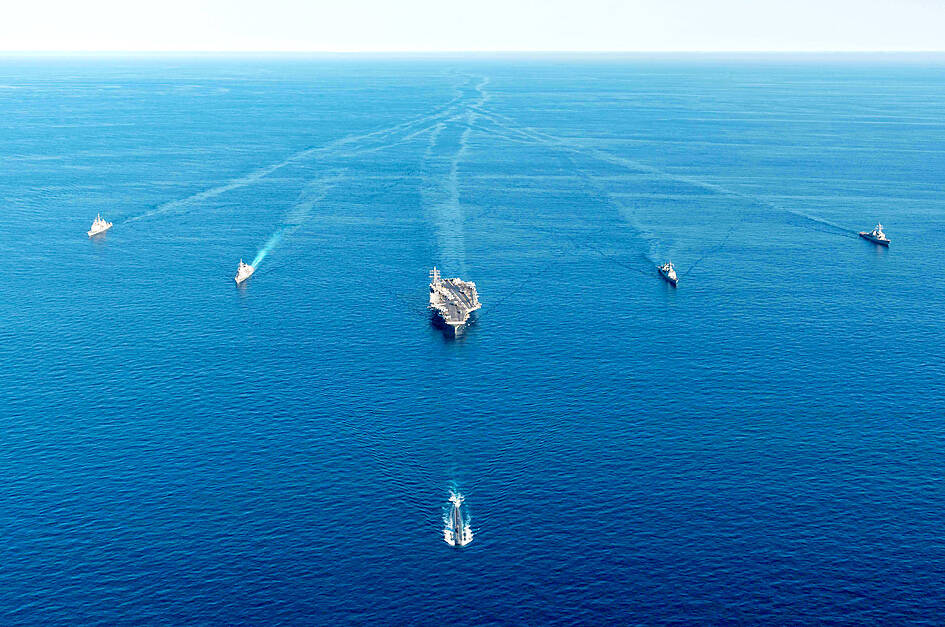South Korean, US and Japanese warships launched their first trilateral anti-submarine drills in five years yesterday, after North Korea renewed missile tests in an apparent response to bilateral training by South Korean and US forces.
Pyongyang’s most recent five missiles launches, the first such tests in a month, also came before and after US Vice President Kamala Harris visited South Korea on Thursday and reaffirmed the “ironclad” US commitment to the security of its Asian allies.
The one-day three-nation training off the Korean Peninsula’s east coast is meant to cope with a North Korean push to advance its ability to fire missiles from submarines, the South Korean navy said in a statement.

Photo: AFP / South Korean Defence Ministry
North Korea has in the past few years been building bigger submarines, including a nuclear-powered one, and testing sophisticated missiles that can be fired from them.
South Korean officials last week said they had detected signs that North Korea was preparing to test-fire a missile from a submarine.
The joint drills involve the nuclear-powered aircraft carrier USS Ronald Reagan, and US, South Korean and Japanese destroyers, the navy statement said.
During the training, the ships were to search and track a US nuclear-powered submarine posing as a North Korean submarine, media reports said.
“We will respond and neutralize any forms of North Korean provocations in an overwhelming and decisive manner,” South Korean navy Captain Cho Chung-ho, commander of his country’s troops who took part in the training, was quoted as saying in the statement.
The training came as South Korea and Japan are looking to mend ties frayed over history and trade disputes.
The two countries together host a total of 80,000 US troops.

Right-wing political scientist Laura Fernandez on Sunday won Costa Rica’s presidential election by a landslide, after promising to crack down on rising violence linked to the cocaine trade. Fernandez’s nearest rival, economist Alvaro Ramos, conceded defeat as results showed the ruling party far exceeding the threshold of 40 percent needed to avoid a runoff. With 94 percent of polling stations counted, the political heir of outgoing Costa Rican President Rodrigo Chaves had captured 48.3 percent of the vote compared with Ramos’ 33.4 percent, the Supreme Electoral Tribunal said. As soon as the first results were announced, members of Fernandez’s Sovereign People’s Party

EMERGING FIELDS: The Chinese president said that the two countries would explore cooperation in green technology, the digital economy and artificial intelligence Chinese President Xi Jinping (習近平) yesterday called for an “equal and orderly multipolar world” in the face of “unilateral bullying,” in an apparent jab at the US. Xi was speaking during talks in Beijing with Uruguayan President Yamandu Orsi, the first South American leader to visit China since US special forces captured then-Venezuelan president Nicolas Maduro last month — an operation that Beijing condemned as a violation of sovereignty. Orsi follows a slew of leaders to have visited China seeking to boost ties with the world’s second-largest economy to hedge against US President Donald Trump’s increasingly unpredictable administration. “The international situation is fraught

MORE RESPONSIBILITY: Draftees would be expected to fight alongside professional soldiers, likely requiring the transformation of some training brigades into combat units The armed forces are to start incorporating new conscripts into combined arms brigades this year to enhance combat readiness, the Executive Yuan’s latest policy report said. The new policy would affect Taiwanese men entering the military for their compulsory service, which was extended to one year under reforms by then-president Tsai Ing-wen (蔡英文) in 2022. The conscripts would be trained to operate machine guns, uncrewed aerial vehicles, anti-tank guided missile launchers and Stinger air defense systems, the report said, adding that the basic training would be lengthened to eight weeks. After basic training, conscripts would be sorted into infantry battalions that would take

GROWING AMBITIONS: The scale and tempo of the operations show that the Strait has become the core theater for China to expand its security interests, the report said Chinese military aircraft incursions around Taiwan have surged nearly 15-fold over the past five years, according to a report released yesterday by the Democratic Progressive Party’s (DPP) Department of China Affairs. Sorties in the Taiwan Strait were previously irregular, totaling 380 in 2020, but have since evolved into routine operations, the report showed. “This demonstrates that the Taiwan Strait has become both the starting point and testing ground for Beijing’s expansionist ambitions,” it said. Driven by military expansionism, China is systematically pursuing actions aimed at altering the regional “status quo,” the department said, adding that Taiwan represents the most critical link in China’s